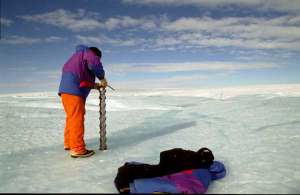
A climatologist analyzes climate patterns to provide an understanding of the conditions of a particular area, and help the citizens of that area adapt to their surroundings.
What Is Climatology?
Climatology is more than just the study of weather. NASA defines climate as “the description of the long term weather pattern of a particular area.” There is even an old saying that sums this up quite nicely, “Climate is what you expect, weather is what you get.”
Climatology is the study of the myriad factors that influence weather, and the influence of weather on the environment. These include water, atmosphere, and geology. Climatology studies all of these things over the course of time, typically a 30 year cycle.
What Does a Climatologist Do?
The job of a climatologist is varied and exciting. Depending on the position, a climatologist might be called upon to wear many different hats. A climatologist might do hands on research such as taking water or soil samples, then analyze and report on the data. They may make presentations on their research at seminars or conferences, or provide an analysis of other research to employers, government officials, or other interested parties.
Climatologists can also be problem solvers, applying the research to address local climate issues, or to determine how to best work under different climate conditions. For example, they can work with or as weather forecasters, working to improve accuracy through developing new measurement tools and statistical models; conduct simulations; and translate findings into more easily understood terms for the general public.
Environmental Contribution
Climatologists are in a unique position to make a positive impact on the environment by working with industry to mitigate their effect on the environment and also to work within the environmental constraints of an area to maximize savings and profit for the company as well as minimize environmental impact.
Where Do Climatologists Work?
Climatologists can work in academic and research institutions as well as government, public or private agencies, and nonprofits. Climatologists can also take on a consulting role, working for engineering and environmental consulting firms.
Work Environment
Climatologists can choose lab, office or field work, or find a position with a combination of all three.
Work Hazards
In any lab or field setting, there can be an element of risk. However, with proper safety precautions, the risk of injury is low for a climatologist.
Work Schedules
Due to the varied types of work available to a climatologist, you should be able to find any type of work schedule that appeals to you. Consulting work can be either full time or part time, and often involves travel. Lab, field and research work are often flexible.
What Is the Average Climatologist Salary?
According to the Bureau of Labor Statistics, in 2020 the median annual salary for atmospheric scientists, including climatologists, was $99,740, with a salary range between $52,350 and $153,150.*
Career Trajectory
From entry level workers with a bachelor's degree through PhD level positions, there is tremendous opportunity for growth in this field.
Job Demand
The demand for climatologists is expected to grow at a rate of about 8 percent between 2020 and 2030. The most likely growth will occur in private industry.*
Climatology Jobs & Job Description
A climatologist's job is to study and predict long-term weather patterns and the processes that cause them. This career choice requires a set of responsibilities, which vary significantly from job to job, but the list here includes typical job duties that may be expected of a climatologist:
- Analyze and interpret data obtained from meteorological stations, radar and satellite imagery, and computer models
- Analyze historical climate data; use models to predict future climate trends
- Research influencers that affect climate change
- Explain and illustrate how climate may impact wetland ecology, biodiversity, and human health
- Communicate research findings to the international scientific community and the public
- Conduct research on atmospheric events
- Develop and analyze mathematical computer data models
Senior Climatologists often have enhanced job responsibilities that focus on management of the working team's budgeting and collaboration. Such responsibilities often include:
- Reporting to and advise policy-makers and other stakeholders regarding the use and interpretation of climatological information
- Providing consultation and advice to outside agencies, professionals, or researchers
- Making scientific presentations, reports, and articles for internal or external partners or the general public
- Engaging in the design and development of new meteorological data collection
- Developing software programs to support predictive modeling
- Planning, organizing, and participating in outreach programs
- Reporting on findings for analysis and conclusions through internal and external channels
- Ensuring that systems and methods of design, planning, data analysis, modeling and projections, associated documentation and development meet the goals of the workgroup and stakeholders
- Creating funding applications and reporting to senior administrators
- Overseeing team budgets, milestones, and systems
- Assisting and mentoring team members
- Establishing valid and efficient workgroup protocols
- Supporting team members' research by providing mentoring
What Are the Education Requirements to Become a Climatologist?
Entry level climatology positions will require a bachelor's degree in climatology or a related field such as meteorology or atmospheric science. For research and academic positions, a Master's or PhD will be required.
Prior Training and Experience
Although prior experience is often not required for entry level positions, it does provide an edge. Look for internship or volunteer experience to fill a potential void on your resume.
Licensing and Certification
Although not required at this time, obtaining a professional certificate provides many advantages. These include demonstrating a level of commitment to the field, entering the profession at a higher level and qualifying for a higher salary.
Related Degree Options for Climatologists
Professional Organizations and Societies
- American Association of State Climatologists: Since 1976, this professional organization brings together state and regional climatologists and other interested parties to improve climate services throughout the country.
- American Institute of Physics: With a mission to “advance, promote and serve the physical sciences for the benefit of humanity,” the AIP and its member societies serve scientists and laymen alike who are interested in staying abreast of the latest research.
- American Meteorological Society: Founded almost one hundred years ago, today the AMS has a membership of over 14,000 people. Through the AMS climatologists can pursue certification and attend conferences, and members can access their comprehensive information and education.
*2020 US Bureau of Labor Statistics salary figures and job growth projections for atmospheric scientists reflect national data not school-specific information. Conditions in your area may vary. Data accessed September 2021.
Other Resources
- The Climate Institute: The Climate Institute is an organization committed to finding practical solutions to climate problems through research and education. Their findings are presented through their website.
- National Oceanographic and Atmospheric Administration: An evolution of the Survey of the Coast, which was founded in the 18002, NOAA provides weather forecasts, climate monitoring, and a host of other climate services.





